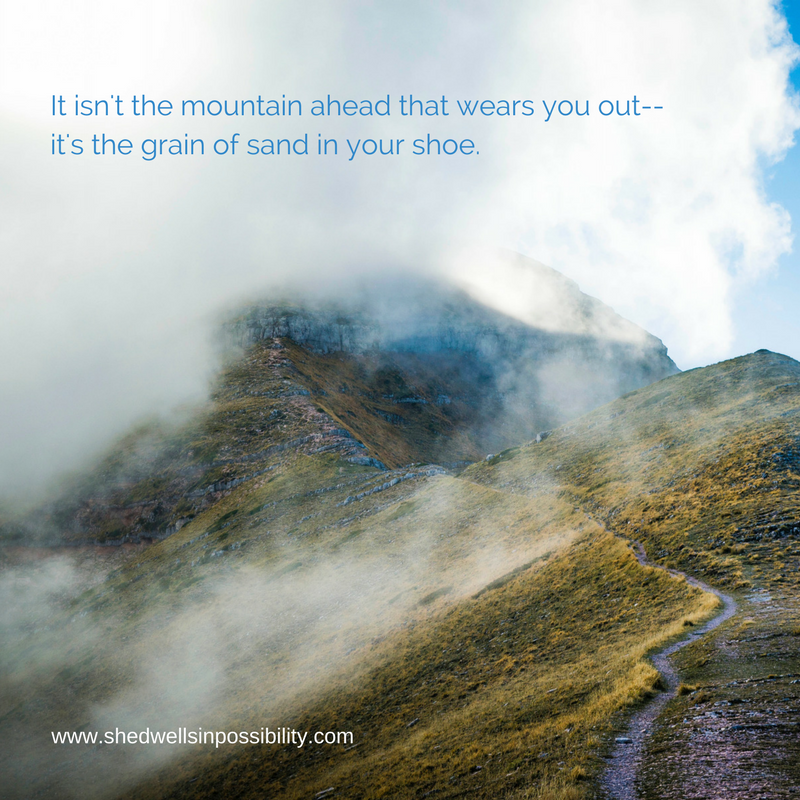This has been an unbelievably tough semester. There’s a long list of reasons why, but I won’t get into them here. The point is, I’ve been itching to work on She Dwells for months–literally, months. And I haven’t managed to do that until now.
Why now? That’s an excellent question. I wish I had an excellent answer. All I can tell you is that, this morning, I decided I was going to make time for a blog post. On other days, I’d think about writing a post and just sigh. One more thing to get done. How am I going to do it all?
This morning, that didn’t happen. I thought about blogging, and then I thought Yes. And then I sat down and started thinking about why it took me so long to get here.
The quote at the top of this post is attributed, in various places, to the poet Robert W. Service and the boxer Muhammed Ali. According to Quote Investigator, it didn’t originate with either one of them. Its origins, in fact, are somewhat mysterious. And I love that, because the idea behind this quote is older than any human being. It’s probably as old as sand itself.
Some versions of this quote use “the pebble in your shoe” rather than “the grain of sand.” I’ve gone with the latter because, as we all know, it doesn’t take a pebble to make you stop in your tracks. One tiny piece of sand against your pinky toe will do the trick.
The poet William Blake suggests that we can see “a World in a Grain of Sand.” It’s certainly true that the sand in your shoe feels much larger than it is. Maybe not as large as the whole world, but still–that grain of sand suggests the rock it once was. And it has the power to do big things. Erosion, abrasion–wearing down, wearing away–it all comes back to grains of sand.
On the level of my personal life, the question becomes Where is the sand in my shoes? What’s keeping me from getting where I want to be? What’s wearing me down, wearing me out?
This is always the time of year when I start questioning my chosen career, but I really don’t think that’s the problem. I enjoy teaching, most of the time. I think I’m pretty good at it. When students come back to tell me that something I’ve said in class made a difference in their lives, that’s when I know I never want another job. This one would be hard to beat.
So, where is the sand in my shoes?
One grain of sand I know all too well is my standards for myself. They’re ridiculously high. If my children aren’t thriving–obviously, that’s my fault. They’re adults, they’re self-sufficient people–still, my fault. I should have done something different when they were younger. Taught them different lessons, or taught them better.
Those high standards aren’t limited to my children, of course. My job performance, my health, my marriage–whatever isn’t absolutely perfect, even for a moment, is (obviously) my fault.
The difficulty with this sort of sand is that you can’t just dump it out and be done with it. I think of that whenever someone tells me Give yourself a break. If that were possible, I would have done it a long time ago. I would love to get rid of this sand. But the best I can do is be aware of the way it’s working against me, then make the decision to let it go. Again and again and again.
Another grain of sand: my willingness to “take one for the team.” I’m about to step down from a position I’ve occupied at my university for the last 12 years, a position I created to fill a need. (That’s right, I created more work for myself. Willingly.) I’m currently serving in a faculty governance position because, when asked if I’d run for office, I found it difficult to decline. Saying no isn’t something I struggle with, usually. But when I can see that I have something to offer–and that my reluctance is based only on the fact that I don’t want to–it’s hard for me to give something a miss. More often than not, I give myself a talking-to about sharing the load instead. And then I get busy doing whatever needs to be done.
I won’t introduce you to every grain of sand in my shoes. I know you’re struggling with your own. And I know there are people who will tell you that the problem is all in your attitude. Just don’t let it bother you. If you’ve ever tried ignoring a grain of sand in your shoe, you know how well that works.
The problem with this advice is that it makes your response the problem–not the sand that’s actually causing you pain. There may be times in our lives when we have to live with pain, but living with is not the same as ignoring. It means learning to adapt. Figuring out how to respond in more productive ways. And if we don’t get rid of the sand whenever we’re able–well, that’s a problem of another sort.
When you find yourself feeling worn down, take a moment to figure out what’s working against you. If it’s fixable–fix it. Dump that sand. (That doesn’t mean it’s gone for good, but sometimes gone for now is good enough.) And if it isn’t fixable–well, maybe new shoes will do the trick. Or thicker socks. Or a different, less sandy, path forward. They’re worth a try, anyway.
The important thing is to realize that just putting up with that sand–telling ourselves that we should be tough enough to deal with it–often keeps us from getting where we want to go. It wears us down before we’re even in sight of the goal.





No Comments